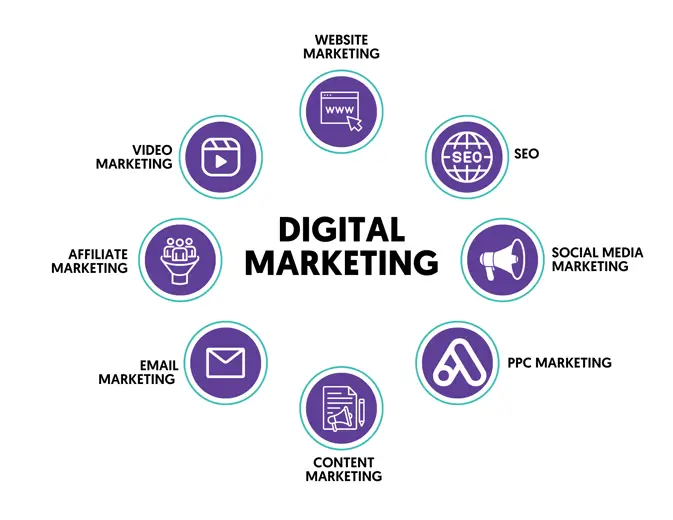100+ The opportunity to introduce the job of the Category Marketer
Marketer Jobs - High-Paying Opportunities
1. What is Marketing?
Marketing activities include all the steps to bring products or services from the manufacturing process to the end consumer. These activities include:
-
Conducting market research to understand customer needs.
-
Developing products/services that meet those needs.
-
Implementing promotional and communication activities to introduce and attract customers.
-
Distributing products in the market for easy customer access.
-
Meeting customer needs and providing value through the products/services they provide.
-
Retaining customers through appropriate strategies.
The main goal of marketing activities is to understand customer needs, provide suitable solutions through products/services and businesses, to bring maximum value to both customers and businesses
2. Who is a Marketer?
A marketer is someone who utilizes the above-mentioned marketing methods to promote products or services. One way to measure a marketer's success is through the growth in revenue and profits of the company. A successful marketer will also be a strategic leader as they can lead different projects ranging from product innovation to positioning, pricing to communication.
Experts working in the marketing and advertising departments of a corporation seek to attract the attention of key potential targets through advertising campaigns. Or, promotional programs targeted at specific audiences may involve celebrity endorsements, catchy slogans, memorable packaging or graphic design, and exposure through overall media contact. Marketing is based on thinking about customer needs and their satisfaction.
Marketing differs from sales because "Sales relate to techniques and tactics of getting people to exchange their hard cash for your product. It doesn't relate to the values the exchange represents. And it's not like immutable marketing, viewing the entire business process as an integrated effort to discover, invent, arouse and satisfy customer needs." In other words, marketing relates less to getting customers to pay for your product because it develops the need for that product and meets customer needs

3. What do Marketers do?
Marketers are responsible for developing and implementing strategies to promote brands, products, and services, maximizing profits for the company. They monitor trends and develop pricing strategies and advertising campaigns. They also compile demographic data and develop targeted strategies to build better awareness of the products and services the company provides.
Some of their key responsibilities include:
-
Coordinating the planning of promotional marketing programs with team members from sales, marketing, advertising, product design, and product development.
-
Making editorial and content development schedules for different media channels and platforms.
-
Helping with the planning, creation, and positioning of email blasts, social media advertisements, conventional media advertisements on TV and radio, and billboards.
-
Creating a brand style guide that most effectively expresses the goal and voice of the client or firm.
-
Aiding project managers in creating, allocating, and overseeing each project's budget.
-
Meeting with customers to go over budget, schedule, goals, and brand requirements.
-
Gathering information for focused marketing initiatives by doing market research to ascertain the requirements, preferences, habits, interests, and other pertinent aspects of a target population.
-
Researching prior campaigns that were successful to determine what went well, what didn't, and what may be improved.
-
Evaluating a campaign's performance and progress, making any required modifications, or submitting suggestions for future initiatives
4. What are the methods of Marketing?
Ultimately, marketing is the process of consumers learning about and purchasing products and services. However, there are many strategies that marketers utilize to make this happen. Below are 12 different forms of marketing:
-
Brand building
-
Paid advertising
-
Relationship marketing
-
Purpose-driven marketing
-
Word-of-mouth
-
Point-of-purchase marketing
-
Transactional marketing
-
Direct sales
-
Social media and viral marketing
-
Referral programs
-
Search engine marketing
-
Email marketing
Branding - Branding is a form of marketing that makes a product or service appealing and instantly recognizable. It often includes slogans, names, and unique graphics, such as a logo.
Paid advertising - This form of marketing refers to several different approaches, including print advertising and television advertising. However, the most common form of advertising today is Internet marketing, such as pay-per-click (PPC) and sponsored advertising.
Relationship marketing - This marketing method focuses on building relationships with customers and improving customer loyalty. Using this strategy, they provide customers with information about their products that directly match the customer's preferences and needs.
Purpose-driven marketing - This is a marketing strategy used by for-profit businesses where the organization links their products and services to a social issue or cause. With cause marketing, the marketing company promotes an idea or goal more than a specific product or service.
Word-of-mouth marketing - In this form of marketing companies use satisfied customers to promote their business. The goal is to provide customers with an awesome product or service and an overall positive experience so they share their experience with people they know. This is one of the most powerful forms of marketing because customers trust recommendations from friends and family and are more likely to purchase from an organization after hearing about it this way.
Point-of-purchase marketing (POP) - occurs when a company places a display next to the goods it is advertising. This display is typically located in the checkout area, although it can be positioned strategically in high-traffic aisles. Weekly advertised special flyers are also a form of POP marketing.
Transactional marketing - With transactional marketing, companies encourage consumers to purchase by providing coupons and discounts. Promotional events are also a form of transactional marketing. The goal is to increase sales potential by providing a special promotional program to drive potential buyers.
Direct sales - This type of marketing requires direct interaction with customers, where sales representatives discuss the role the product or service can play in the consumer's life. This is a common approach multi-level marketing companies use to promote their products and services.
Social media and viral marketing - Social media marketing uses social platforms to connect with audiences, increase brand awareness, drive website traffic and promote products or services. It is a valuable strategy for reaching customers because companies can focus their attention on platforms where people in their target market spend most of their online time. Viral marketing is where the general public is sharing content rather than just the target audience. This advertising style relies on an object to generate message sharing. While there is no way to predict which content will spread, this type of marketing often occurs alongside a company's social media campaign.
Referral programs - With this form of marketing, a company provides discounts or incentives for customer referrals that lead to business. A referral program leverages word-of-mouth but in an intentional, systematic way to encourage people to share your brand.
Search engine marketing - Search engine marketing (SEM) occurs when companies create content to rank highly in search engines. By creating unique, valuable content, an organization can generate backlinks to its content and increase the ranking of its entire company website.
Email marketing - Email marketing is the process of sending messages to potential or current customers. Those emails can include niche market information, industry news, or advertising. They may also seek business or drive sales
4. How can sales and marketing collaborate?
Marketing and sales are closely linked. To work effectively together, marketing activities should be integrated with sales, attracting potential customers helping turn them into leads through email campaigns and other marketing strategies, and working with sales to convert them into long-term customers.
By ensuring that marketing and sales are operating in sync, a company can achieve higher revenue, convert more potential customers into customers, and retain a significant percentage. Marketing has access to data showing the type of content and language customers respond to. Conversely, sales representatives have an in-depth understanding of the company's ideal customer profile and sales goals.
By encouraging and facilitating information flow between marketing and sales, a company can create more effective marketing campaigns and content to shorten the sales cycle and increase revenues














